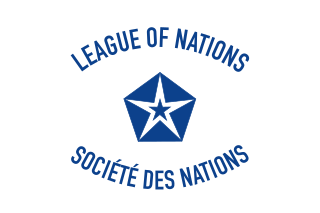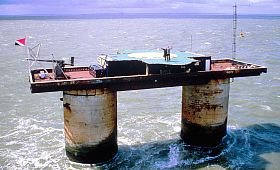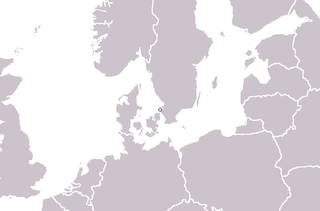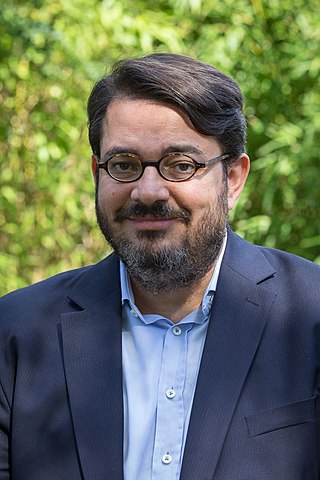
The dot-com bubble was a stock market bubble that ballooned during the late-1990s and peaked on Friday, March 10, 2000. This period of market growth coincided with the widespread adoption of the World Wide Web and the Internet, resulting in a dispensation of available venture capital and the rapid growth of valuations in new dot-com startups.

The League of Nations was the first worldwide intergovernmental organisation whose principal mission was to maintain world peace. It was founded on 10 January 1920 by the Paris Peace Conference that ended the First World War. The main organization ceased operations on 18 April 1946 when many of its components were relocated into the new United Nations. As the template for modern global governance, the League profoundly shaped the modern world.

A micronation is a political entity whose representatives claim that they belong to an independent nation or sovereign state, but which lacks legal recognition by any sovereign state. Micronations are classified separately from de facto states and quasi-states; they are also not considered to be autonomous or self-governing as they lack the legal basis in international law for their existence. The activities of micronations are almost always trivial enough to be ignored rather than disputed by the established nations whose territory they claim—referred to in micronationalism as "macronations". Several micronations have issued coins, flags, postage stamps, passports, medals and other state-related items, some as a source of revenue. Motivations for the creation of micronations include theoretical experimentation, political protest, artistic expression, personal entertainment and the conduct of criminal activity. The study of micronationalism is known as micropatriology or micropatrology.

The Principality of Sealand is a micronation on HM Fort Roughs, an offshore platform in the North Sea approximately twelve kilometres off the coast of Suffolk, England. Roughs Tower is a Maunsell Sea Fort that was built by the British in international waters during World War II. Since 1967, the decommissioned Roughs Tower has been occupied and claimed as a sovereign state by the family and associates of Paddy Roy Bates. Bates seized Roughs Tower from a group of pirate radio broadcasters in 1967 with the intention of setting up his own station there. Bates and his associates have repelled incursions from vessels from rival pirate radio stations and the U.K.'s royal navy using firearms and petrol bombs. In 1987, the United Kingdom extended its territorial waters to 12 nautical miles, which places the platform in British territory.

X-COM: Apocalypse is a 1997 science fiction tactical strategy game. It is the third game in the X-COM video game series. It was developed by Mythos Games, and published by MicroProse in 1997 for DOS and Microsoft Windows.
An artistic language, or artlang, is a constructed language designed for aesthetic and phonetic pleasure. Constructed languages can be artistic to the extent that artists use it as a source of creativity in art, poetry, calligraphy or as a metaphor to address themes such as cultural diversity and the vulnerability of the individual in a globalizing world. They can also be used to test linguistical theories, such as Linguistic relativity.

Ladonia is a micronation, proclaimed in 1996 as the result of a years-long court battle between artist Lars Vilks and local authorities over two sculptures. The claimed territory is part of the natural reserve of Kullaberg in southern Sweden.

The Aerican Empire, conventionally referred to in short form as Aerica, is a social organization and self-proclaimed micronation, founded in May 1987. Its name stems from the term "American Empire". In 2000 The New York Times described its website as "one of the more imaginative" micronation sites.

Molossia, officially the Republic of Molossia, is a micronation claiming sovereignty over 11.3 acres of land near Dayton, Nevada. The micronation has not received recognition from any of the member states of the United Nations. It was founded by Kevin Baugh. He continues to pay property taxes on the land to Storey County, the recognized local government, although he calls it "foreign aid". He has stated "We all want to think we have our own country, but you know the United States is a lot bigger".

Talossa, also known as the Kingdom of Talossa, is one of the earliest micronations – founded in 1979 by then-14-year-old Robert Ben Madison of Milwaukee and at first confined to his bedroom; he adopted the name after discovering that the word means "inside the house" in Finnish. Among the first such projects still maintained, it has kept up a web presence since 1995. Its internet and media exposure since the late 1990s contributed to the appearance of other subsequent internet micronations.

Micronations: The Lonely Planet Guide to Home-Made Nations is an Australian gazetteer about micronations, published in September 2006 by Lonely Planet. It was written by John Ryan, George Dunford and Simon Sellars. Self-described as a humorous guidebook and written in a light-hearted tone, the book's profile of micronations offers information on their flags, leaders, currencies, maps and other facts. It was re-subtitled Guide to Self-Proclaimed Nations in later publications.

In the context of the United States, secession primarily refers to the voluntary withdrawal of one or more states from the Union that constitutes the United States; but may loosely refer to leaving a state or territory to form a separate territory or new state, or to the severing of an area from a city or county within a state. Advocates for secession are called disunionists by their contemporaries in various historical documents.

The International Socialist Tendency (IST) is an international grouping of unorthodox Trotskyist organisations espousing the ideas of Tony Cliff (1917–2000), founder of the Socialist Workers Party (SWP) in Britain. IST supporters are sometimes called "Cliffites". It has sections across 27 countries; however, its strongest presence is in Europe, especially in Britain.
MicroCon is a biennial summit or conference of micronationalists held in every other year since April 11, 2015. The event was created by Kevin Baugh of the Republic of Molossia, and every summit since has been hosted by a different micronation. MicroCon is a significant event in the micronational community, serving as a venue for exchanging ideas between micronationalists. The event has also been compared to the micronational equivalent of a session of the United Nations General Assembly. The largest edition, MicroCon 2019 in Hamilton, Ontario, Canada, had 113 attendees from 43 micronations. MicroCon 2023 was the first edition to consist of two separate events: an American summit in Joliet, Illinois, and a European summit in Ypres, Belgium.

Micronations and the Search for Sovereignty is a 2021 book by Australian constitutional law specialists Harry Hobbs and George Williams about micronations and their legal status. Written from an academic perspective, it is one of few works on micronational movements and the earliest-published book to focus largely on the legal aspect of micronations. The book concerns the definition of statehood, the place of micronations within international law, people's motivations for declaring them, the micronational community and the ways by which such entities mimic sovereign states. In 2022 Hobbs and Williams published a book for a broader audience, How to Rule Your Own Country: The Weird and Wonderful World of Micronations.
The International Micropatrological Society (IMS) was an American learned society and research institute dedicated to the study of micronations. Founded in 1973 by Frederick W. Lehmann IV of St. Louis, Missouri, the IMS coined micropatrology as the study of micronations and micronationalism. It had documented 128 micronations and similar political entities by 1976.

Although the academic study of micronations—known as micropatriology—is limited, there have nevertheless been a number of published works on the subject. The following is a list documenting these written works. This list does not contain works wherein micronationalism is the secondary theme, such as reference works which contain or make references to micronations and books about individual micronations.














